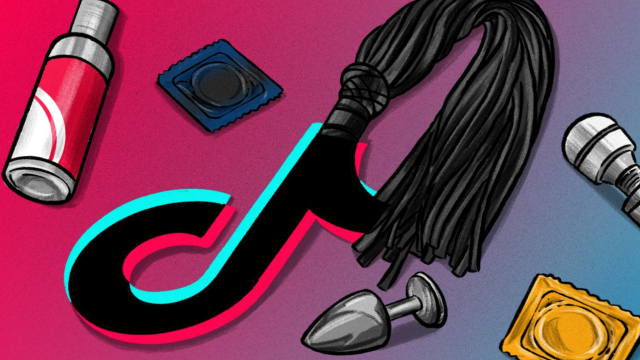Scrolling TikTok, users can find advice ranging from all manner of sex acts to what to put inside their vagina — with that advice itself ranging from boric acid, to ice, to athlete’s foot medication. The app is popular with teens and young adults, many of whom use it to find like-minded communities, explore their sexuality, and learn about topics they might not be able to discuss with anyone in the outside world, but like anything else online, navigating it requires some savvy. It’s important to separate what’s factual from actively dangerous, so Lifehacker turned to the experts for some tips. (Please, do not put boric acid, ice, or athlete’s foot medication in any of your orifices without doing some research or consulting a doctor.)
Understand the algorithm
TikTok’s iconic “For You Page” shows curated clips that become more relevant to your interests the more you engage with the app. Engage with sketchy information, and guess what? You’re likely to be served up more sketchy information.
“Because TikTok promotes trends, ‘health trends’ that often have no backing in science tend to circulate the app and can actually be quite dangerous to users,” explained Canela López, a Brooklyn-based sex and relationships reporter for Insider who focuses much of their work on the digital space. “For example, there are many DIY douching techniques on TikTok to help ‘clean your vagina,’ but douching is a generally frowned upon practice.”
Consider the source
The solution here, says López, is doing your own research outside the app.
“While there are users that say they are medical professionals, OB/GYNs, and sex educators, it’s important to check their credentials online before taking what they say as fact. See an account with interesting information? Google the owner of the account if you can. If you can’t, I recommend researching the information a bit more online or asking your doctor.”
Chrissy Chlapecka, a 20-year-old TikToker with almost 3 million followers, also suggests being aware not only of a creator’s credentials, but their background and lived experiences — some of which she’s found are more ubiquitous on the platform than others.
“I realise that as a white person, the TikTok algorithm is 100% in my favour. They are constantly silencing Black creators. Yes, you can learn a lot through TikTok, but you’re really only learning through white experiences if that’s really all the For You Page is giving you. I think it’s important to be mindful that whenever you see a Black creator on your For You Page to boost their videos by liking, commenting, sharing, and following them.”
López agreed, adding, “I have heard from multiple creators anecdotally that queer creators of colour often get shadow-banned/are less likely to get views because of the way the algorithm is set up.”
[referenced id=”1047851″ url=”https://www.lifehacker.com.au/2021/02/how-your-partners-birth-control-can-affect-your-sex-life-and-what-to-do-about-it/” thumb=”https://www.gizmodo.com.au/wp-content/uploads/sites/4/2021/02/22/partner-birth-control-sex-life-300×152.png” title=”How Your Partner’s Birth Control Can Affect Your Sex Life (And What to Do About It)” excerpt=”Birth control is unique among medical interventions, not least of all because its name straight-up tells you what it does — it controls birth by preventing pregnancy. Beyond that, though, there are a lot of other things birth control can do. Some are great: Hormonal birth control can clear skin…”]
Find your community
Millennials and tech neophytes take heart: Alleged shadow-banning aside, TikTok still functions a lot like any other social media platform and you can search for hashtags or see which accounts your favourite creators are following to get a better sense of who else you might want to engage with.
Chlapecka’s audience, for instance, tunes in to see her make videos promoting what she brands her “bimbo” lifestyle of wearing pink, loving glitter, and being openly sexual, which is a direct response to what she sees as a societal acceptance of abusive behaviour and cisheteronormativity.
After leaving a relationship she defines as abusive, she started making in-your-face posts that resonated with others, and she quickly found a community that made her feel understood and whom she endeavours to make feel understood in return.
“I started making content that would empower others, especially women, those who are feminine, members of the LGBTQ community like myself, etc.,” she said.
While memes about doing kegels, having a “gorilla grip pussy,” and performing techniques like “the Gluck Gluck 9000” are all over the For You Page, remember that sexuality is as much about education and empowerment as it is about any physical attributes or Kama Sutra-style advice.
López added, “One of the more positive sides of TikTok is if you’re looking for queer or trans content, the algorithm tends to recommend those videos if you start liking them. It can be really difficult to find information for queer sexuality online, so I think this is a really remarkable place for queer content creators.”
Where to start
“Teens generally turn to TikTok because it’s a platform made for them and popularised by teens. Aside from that, the information is quick, digestible, and easy to access. Even as a health journalist, I often will look to TikTok for sources or ideas because the medical professionals that are on it tend to explain concepts in an easy to understand way,” said López.
So, want to start following educational, empowering TikTokers yourself and avoid wayward advice about putting untested substances near your private parts? López and Chlapecka shared some of their favourites. Try Sexedu, Dr. Jolene Brighten, Griffin Maxwell Brooks, Anania00, Rainaveryd, and Matt Bernstein.

Leave a Reply
You must be logged in to post a comment.